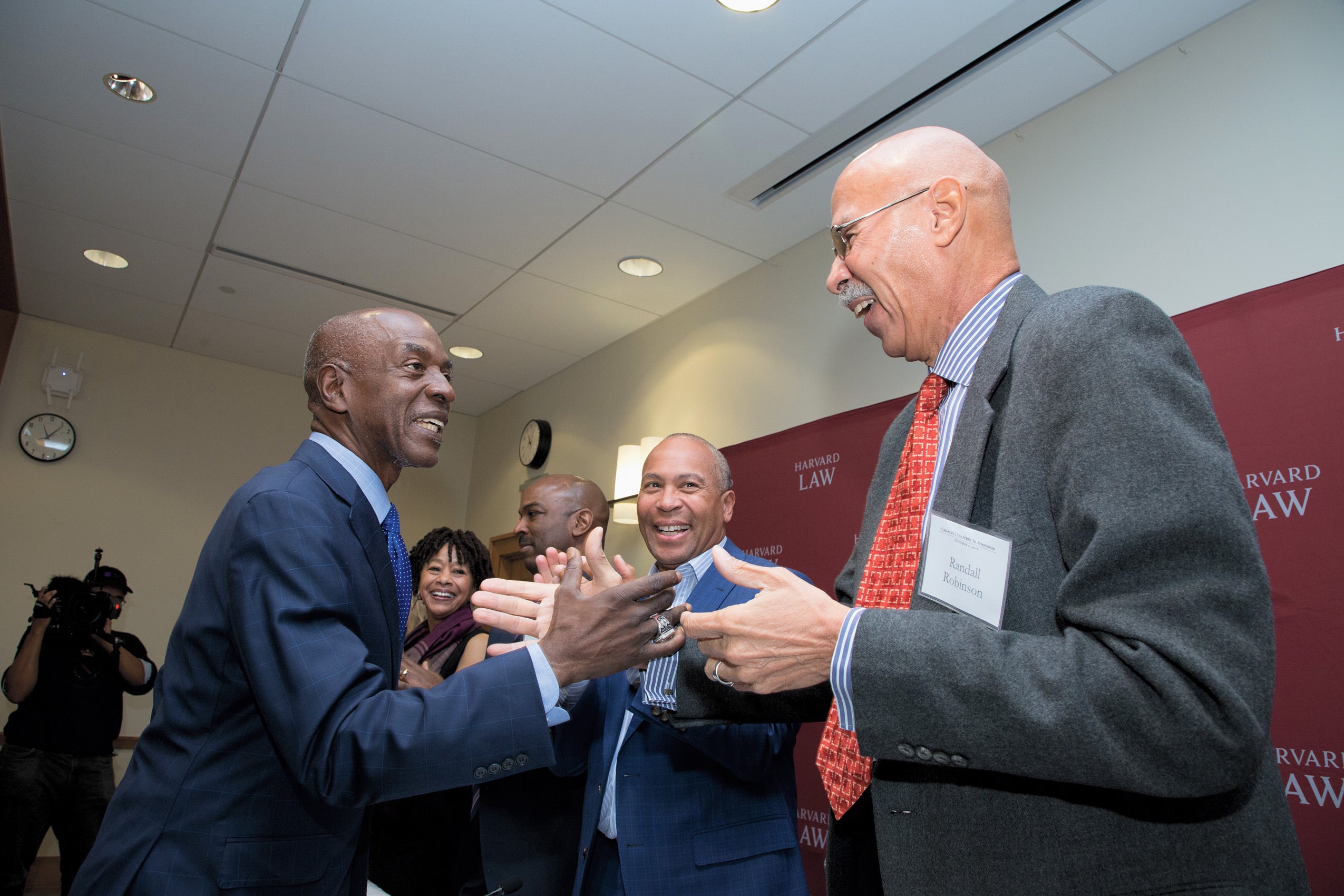On the HLS campus this past fall, eminent friends, students, and colleagues gathered to celebrate a man the world knows as a leading force for racial equality and social justice, and the Harvard community knows affectionately as Tree.
Charles Ogletree Jr. ’78, who was the founding director of the Charles Hamilton Houston Institute for Race & Justice at HLS, announced in the summer of 2016 that he had been diagnosed with Alzheimer’s disease, and that he would work to raise awareness of the disease and its disproportionate effect on African-Americans. Along with the honors and reminiscences, the October 2017 celebration of Ogletree at HLS brought the announcement of a Charles J. Ogletree Chair in Race and Criminal Justice—a way, according to Professor David Wilkins ’80, “to ensure there will always be a scholar here who will carry on Tree’s legacy.”
Attending with his wife, Pam, and their children and grandchildren, Ogletree received a five-minute standing ovation upon his entrance. He shook hands, and high-fived and hugged friends and colleagues, many of whom had traveled across the country for the ceremony.
In his remarks, HLS Dean John F. Manning ’85 said that Ogletree “has done what few can ever dream of: He has changed the world and made it a better place. He has also been an extraordinary teacher. How many people learned to be great trial lawyers in the Criminal Justice Institute that he designed and ran for more than a generation?”
Kenneth Frazier ’78, now the chairman and CEO of the pharmaceutical company Merck & Co., brought memories of being a first-year HLS student alongside Ogletree. Even then, he said, the man’s quiet dignity was much in evidence: “One of the least attractive aspects of our peers and colleagues is that many of us want to be thought of as brilliant. But he’s one of the least showy people I know. Even in the first year he had a special maturity and gravitas, which I would attribute in large part to his already being married to Pam.” Frazier saw the respect Ogletree commands when he met President Barack Obama ’91 in the Oval Office: “He leaned toward me and said, ‘I go way back with Professor Ogletree.’ And I had the distinct feeling there that he was boasting.”
“(Barack Obama) leaned toward me and said, ‘I go way back with Professor Ogletree.’ And I had the distinct feeling there that he was boasting.”
Brandeis University Professor Anita Hill had one of the most publicly salient connections with Ogletree, who represented her in the Clarence Thomas hearings. As Hill pointed out, Ogletree put himself in possible jeopardy by representing her: “His tenure vote was imminent, and his involvement in a sensational public hearing might have made some faculty uneasy about approving his appointment. His career was on the line, with a wife and two young children, yet he agreed to join the team. He was among a lot of brilliant and tough young women, and his willingness to be collaborative showed that he’s an absolutely secure and confident man, and one that believes in equality.”
Other panelists spoke of Ogletree’s accomplishments as a social activist. “It’s one thing to be an advocate for issues around social and economic justice, and that’s enormously important,” said former Massachusetts Gov. Deval Patrick ’82. “It’s a different level entirely to live those values, and that is what Charles has been about.”
Gay McDougall, the former executive director of Global Rights, mentioned his pioneering work related to reparations for slavery and to Jim Crow laws. “He can be credited for moving that national discourse into the mainstream,” she said. She and Randall Robinson ’70, founder and former president of TransAfrica, pointed out Ogletree’s work to raise apartheid awareness and later to help with the drafting of South Africa’s new Constitution. “When the Republican majority in Congress voted to override Ronald Reagan’s veto of South African sanctions, we knew we couldn’t have done it without you,” Robinson said.
There was also talk of Ogletree’s flair and presence. Professor Carol Steiker ’86, faculty co-director of the Criminal Justice Policy Program at HLS, recalled his style at the Public Interest Auction, which he ran for more than two decades to raise money for students doing public interest work. “That was Tree in his element: the voice, the presence, the humor—and the way he rocked a tux,” she said. “He’d start ad-libbing and would just kill it. His famous sweet potato pies always started a bidding war, and one year I kept bidding until they were mine. They cost me an arm and a leg, but they lived up to their legendary hype—as does the man.”
